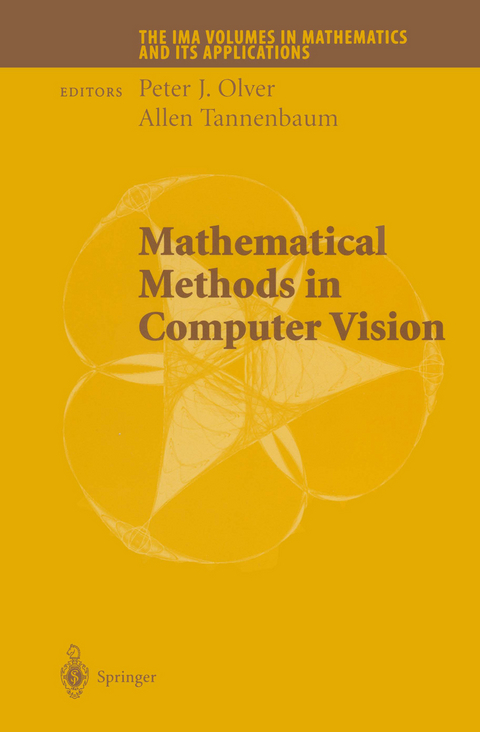
Mathematical Methods in Computer Vision
Seiten
2003
Springer-Verlag New York Inc.
978-0-387-00497-6 (ISBN)
Springer-Verlag New York Inc.
978-0-387-00497-6 (ISBN)
Several mathematical approaches have emerged, including methods based on nonlinear partial differential equations, stochastic and statistical methods, and signal processing techniques, including wavelets and other transform theories.
This volume comprises some of the key work presented at two IMA
Workshops on Computer Vision during fall of 2000. Recent years have
seen significant advances in the application of sophisticated
mathematical theories to the problems arising in image processing.
Basic issues include image smoothing and denoising, image enhancement,
morphology, image compression, and segmentation (determining
boundaries of objects-including problems of camera distortion and
partial occlusion). Several mathematical approaches have emerged,
including methods based on nonlinear partial differential equations,
stochastic and statistical methods, and signal processing techniques,
including wavelets and other transform theories.
Shape theory is of fundamental importance since it is the bottleneck
between high and low level vision, and formed the bridge between the
two workshops on vision. The recent geometric partial differential
equation methods have been essential in throwing new light on this
very difficult problem area. Further, stochastic processes, including
Markov random fields, have been used in a Bayesian framework to
incorporate prior constraints on smoothness and the regularities of
discontinuities into algorithms for image restoration and
reconstruction.
A number of applications are considered including optical character
and handwriting recognizers, printed-circuit board inspection systems
and quality control devices, motion detection, robotic control by
visual feedback, reconstruction of objects from stereoscopic view
and/or motion, autonomous road vehicles, and many others.
This volume comprises some of the key work presented at two IMA
Workshops on Computer Vision during fall of 2000. Recent years have
seen significant advances in the application of sophisticated
mathematical theories to the problems arising in image processing.
Basic issues include image smoothing and denoising, image enhancement,
morphology, image compression, and segmentation (determining
boundaries of objects-including problems of camera distortion and
partial occlusion). Several mathematical approaches have emerged,
including methods based on nonlinear partial differential equations,
stochastic and statistical methods, and signal processing techniques,
including wavelets and other transform theories.
Shape theory is of fundamental importance since it is the bottleneck
between high and low level vision, and formed the bridge between the
two workshops on vision. The recent geometric partial differential
equation methods have been essential in throwing new light on this
very difficult problem area. Further, stochastic processes, including
Markov random fields, have been used in a Bayesian framework to
incorporate prior constraints on smoothness and the regularities of
discontinuities into algorithms for image restoration and
reconstruction.
A number of applications are considered including optical character
and handwriting recognizers, printed-circuit board inspection systems
and quality control devices, motion detection, robotic control by
visual feedback, reconstruction of objects from stereoscopic view
and/or motion, autonomous road vehicles, and many others.
A large deviation theory analysis of Bayesian tree search.- Expectation-based, multi-focal, saccadic vision (understanding dynamic scenes observed from a moving platform).- Statistical shape analysis in high-level vision.- Maximal entropy for reconstruction of back projection images.- On the Monge—Kantorovich problem and image warping.- Analysis and synthesis of visual images in the brain: evidence for pattern theory.- Nonlinear diffusions and optimal estimation.- The Mumford-Shah functional: from segmentation to stereo.- List of workshops participants.
| Erscheint lt. Verlag | 1.10.2003 |
|---|---|
| Reihe/Serie | The IMA Volumes in Mathematics and its Applications ; 133 |
| Zusatzinfo | XII, 156 p. |
| Verlagsort | New York, NY |
| Sprache | englisch |
| Maße | 156 x 234 mm |
| Themenwelt | Informatik ► Theorie / Studium ► Künstliche Intelligenz / Robotik |
| Mathematik / Informatik ► Mathematik | |
| Wirtschaft ► Betriebswirtschaft / Management | |
| ISBN-10 | 0-387-00497-1 / 0387004971 |
| ISBN-13 | 978-0-387-00497-6 / 9780387004976 |
| Zustand | Neuware |
| Haben Sie eine Frage zum Produkt? |
Mehr entdecken
aus dem Bereich
aus dem Bereich
Buch | Softcover (2024)
REDLINE (Verlag)
20,00 €
Eine kurze Geschichte der Informationsnetzwerke von der Steinzeit bis …
Buch | Hardcover (2024)
Penguin (Verlag)
28,00 €


